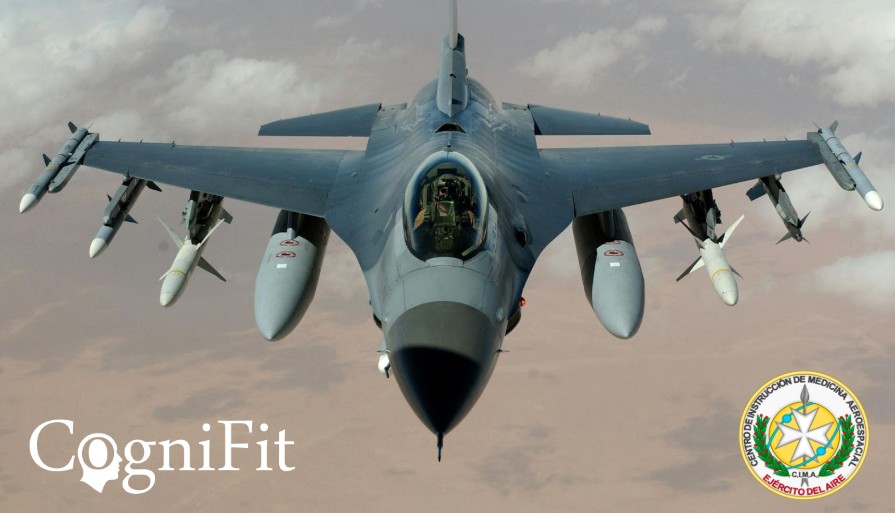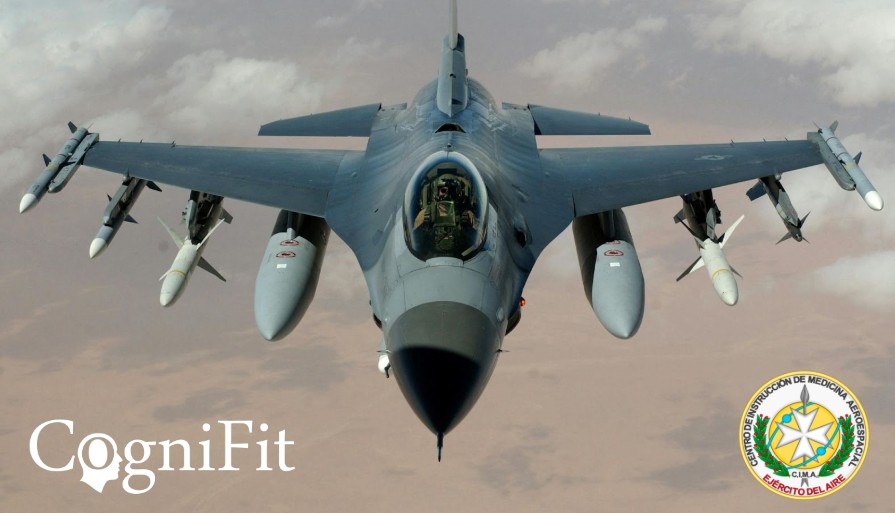
Applied Research From the Aerospace Medicine Training Center (CIMA) Applies CogniFit to Evaluate Army Pilots
The Aerospace Medicine Training Center (CIMA), part of the Spanish Air Force, has long been dedicated to improving the safety and operational capacity of personnel with flight responsibility. One of its core objectives is applied research – particularly the study of how extreme conditions affect cognitive performance in military contexts. In this effort, CIMA has partnered with CogniFit to implement advanced cognitive assessments tailored specifically to the demands of military aviation.
The collaboration between CogniFit and CIMA was formalized on July 23, 2018, laying the groundwork for a groundbreaking cognitive assessment program tailored to military aviation.

Enhancing Safety Through Cognitive Science
Military pilots operate in some of the most challenging environments imaginable. Long missions, extreme physical conditions, and the constant pressure of high-stakes decision-making put enormous strain on cognitive resources. A lapse in attention or a delayed reaction – even by a fraction of a second – can have critical consequences.
To address these challenges, CIMA launched a research initiative focused on understanding how fatigue, stress, and environmental factors impair key cognitive functions. For this project, CogniFit developed a customized version of its Airflight Cognitive Assessment Battery (CAB-AirF) – a scientific tool designed to evaluate the mental skills essential for piloting aircraft.
This offline-ready assessment platform was specifically configured for use in field conditions.
“A specific offline model was created to be able to use cognitive assessments in extreme situations and this was adapted to mobile platforms such as tablets in order to facilitate its use,” said Carlos Rodríguez, CEO at CogniFit.
Tailored for Real Military Needs: Cognitive Skills Tested in the Program
The CAB-AirF battery includes a wide range of neuropsychological tasks designed to evaluate critical domains such as divided attention, focused attention, visual field, estimation, inhibitory control, hand-eye coordination, naming, visual scanning, cognitive flexibility, short-term memory, auditory memory, contextual memory, working memory, non-verbal memory, visual memory, monitoring, auditory perception, spatial perception, visual perception, planning, recognition, reaction time, and processing speed.
These cognitive abilities are particularly relevant in aviation, where pilots must monitor multiple instruments, make real-time decisions under pressure, and maintain situational awareness in dynamic environments. Each of these skills is tested using short, gamified tasks designed to be intuitive, challenging, and scientifically validated.
The CogniFit assessment lasts approximately 30 minutes and is fully adaptable: the number of tasks, the measured skills, and the difficulty level can be configured based on the pilot’s specific role (fighter jet, transport, or helicopter), allowing CIMA to personalize the evaluation protocol.
From Lab to Airfield: How the System Works
The project at CIMA was ambitious in scope. Between 100 and 500 pilots per year would be evaluated across a 10-month training calendar. Given that evaluations needed to take place in areas with limited internet access, CogniFit provided an offline-capable solution that stores raw data locally and syncs it to secure servers when connectivity becomes available.
Each pilot’s performance is automatically processed into a detailed cognitive report, accessible only by authorized personnel. These reports help detect strengths and weaknesses across dozens of cognitive dimensions, making it possible to identify subtle impairments before they affect flight performance.
To ensure the highest level of reliability, CogniFit’s research team collaborated closely with CIMA to validate the battery’s internal consistency and construct validity for this specific population.
Training Under Pressure: Why Cognitive Testing Matters
Fatigue, hypoxia, and emotional stress are known to degrade attention, slow down reaction times, and impair working memory. In aviation, such impairments can jeopardize mission success and crew safety.
A parallel study, conducted by the U.S. Naval Medical Research Unit and published in Aviation, Space and Environmental Medicine, supports this concern. The research found that including measures of reaction time, short-term memory, divided attention, and cognitive flexibility (all measured by CogniFit) significantly improved the prediction of performance under sleep deprivation – increasing the explained variance from 13.8% to 35.7%.
CIMA’s program follows a similar logic: by measuring these variables in advance, flight instructors and medical teams can better anticipate individual differences in performance and resilience, especially in extreme conditions.
Beyond Assessment: Building Norms For Military Profiles
An important long-term goal of the CIMA-CogniFit collaboration is the creation of cognitive performance norms specific to military pilot profiles. Once enough data has been collected – typically over 100 assessments per pilot type – CIMA plans to generate reference baselines for fighter pilots, helicopter pilots, and transport pilots.
This would allow future assessments to compare a candidate’s performance not only to general population norms but also to their specific operational peer group, improving diagnostic accuracy and relevance.
Data Protection and Operational Readiness
Given the sensitive nature of military data, CogniFit ensures that all collected information is anonymized and stored in compliance with international data protection standards, including HIPAA. The assessments are designed to be self-administered, which reduces human error and increases standardization.
Each device (tablet or computer) used in the assessment must meet minimum technical specifications to guarantee performance – a challenge that was addressed in the implementation phase with tailored hardware procurement by CIMA.
Future Applications: Fatigue, Concussion, and Battlefield Readiness
While the current project focuses on cognitive health in controlled training environments, the platform’s offline capabilities, fast deployment, and compact data collection make it well-suited for potential use in operational field conditions.
Cognitive assessments may also support efforts to monitor fatigue, evaluate readiness, and inform decision-making in high-risk scenarios.
Final Thoughts: Cognitive Readiness is Mission Readiness
In an era where technology enhances both opportunity and complexity in military operations, human performance remains the final safeguard. By investing in tools that evaluate and understand the brain’s role in decision-making and action, institutions like CIMA demonstrate a forward-looking commitment to operational excellence and human safety.
CogniFit is proud to support this mission – combining neuroscience, technology, and innovation to ensure that those who take to the skies do so with their minds as prepared as their machines.













